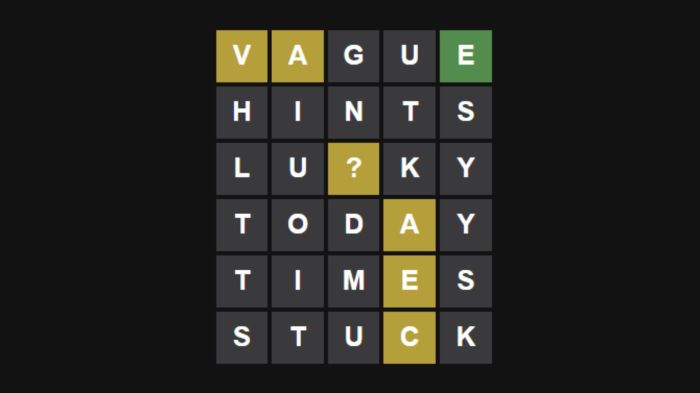- Overreliance on External Guidance:Excessive reliance on strategy guides can hinder the development of independent problem-solving skills. It’s essential to balance external guidance with self-discovery and the exploration of personal strategies.
- Limited Scope:Strategy guides often focus on general principles, potentially neglecting specific nuances of individual Wordle puzzles. Players should be prepared to adapt their strategies based on the unique characteristics of each puzzle.
- Subjectivity of Strategies:Different players may have varying preferences for Wordle strategies. It’s crucial to explore different approaches and find the strategies that best align with individual playing styles.
Wordle Resource Comparison Table
| Resource Name | Category | Features | Accessibility (Free/Paid) | Pros | Cons |
|---|---|---|---|---|---|
| Wordle Helper | Word Lists | Lists of common words, starting words, and words with specific letters | Free | Comprehensive lists, user-friendly interface | Can be overwhelming for beginners, may not include all valid Wordle solutions |
| Wordle Frequency Chart | Frequency Charts | Displays letter frequency in the English language and Wordle solutions | Free | Provides valuable data for word selection, easy to understand | May not be accurate for all Wordle puzzles, can be overly focused on frequency |
| Wordle Tips and Tricks | Strategy Guides | Offers general and advanced Wordle strategies, tips, and tricks | Free | Comprehensive coverage of strategies, easy to follow | May not be applicable to all Wordle puzzles, can be overly prescriptive |
| Wordle Solver | Strategy Guides | Provides solutions and hints for specific Wordle puzzles | Free | Can be helpful for difficult puzzles, offers targeted guidance | May not be available for all puzzles, can lead to overreliance on external help |
| Wordle Bot | Strategy Guides | Utilizes AI to provide optimal word suggestions based on previous guesses | Free/Paid | Offers highly accurate word suggestions, can be helpful for beginners | May not always align with personal preferences, can be too prescriptive |
The Importance of Word Knowledge: Wordle Hint For Today’s Puzzle
In the enthralling world of Wordle, where every guess is a step closer to unraveling the mystery of the day’s hidden word, a robust vocabulary emerges as a potent weapon in your arsenal. A well-stocked lexicon empowers you to navigate the labyrinth of possibilities, transforming you from a mere player into a seasoned word sleuth.A vast vocabulary acts as a treasure trove of potential guesses, providing you with a wider range of words to test and refine your strategy.
With a broader understanding of words, you can deduce the likely letters and their positions with greater precision, eliminating improbable combinations and zeroing in on the correct solution.
Strategies for Vocabulary Expansion
Embarking on a journey to expand your vocabulary is a rewarding endeavor that can significantly enhance your Wordle prowess.
- Embrace the Power of Reading:Immersing yourself in literature, newspapers, and online articles exposes you to a diverse array of words, enriching your vocabulary in a natural and engaging way. The more you read, the more words you encounter and absorb, enhancing your word recognition skills.
- Engage with Word Games:Word games like Scrabble, Boggle, and even Wordle itself provide a fun and interactive way to learn new words and strengthen your vocabulary. These games challenge you to think creatively and strategically, fostering a deeper understanding of word formation and usage.
- Delve into Etymology:Exploring the origins and evolution of words can unlock a deeper understanding of their meanings and nuances. By understanding the roots, prefixes, and suffixes of words, you can decipher the meanings of unfamiliar words and enhance your vocabulary.
- Utilize Vocabulary-Building Resources:Numerous online resources, such as vocabulary.com and Merriam-Webster’s vocabulary builder, offer interactive exercises, quizzes, and word lists to help you expand your lexicon. These resources can provide targeted practice and feedback, accelerating your vocabulary growth.
Understanding Word Roots, Prefixes, and Suffixes, Wordle hint for today’s puzzle
The ability to decipher the components of words can be a game-changer in Wordle. By understanding word roots, prefixes, and suffixes, you can often deduce the meaning of an unfamiliar word and its potential variations.
- Word Roots:These are the core meanings of words, often derived from Latin or Greek. For example, the root “scrib” means “to write,” so words like “scribe,” “script,” and “inscribe” all relate to writing.
- Prefixes:These are word parts added to the beginning of a word to modify its meaning. For instance, the prefix “un-” means “not,” so “unhappy” means “not happy.”
- Suffixes:These are word parts added to the end of a word to modify its meaning or grammatical function. The suffix “-ing” indicates an ongoing action, as in “writing.”
The Social Aspect of Wordle
Wordle, the daily word puzzle game, has become a global phenomenon, transcending its digital confines to become a significant part of many people’s daily lives. Beyond the individual challenge of guessing the five-letter word, Wordle has fostered a vibrant community of players who share their experiences, strategies, and triumphs online.






